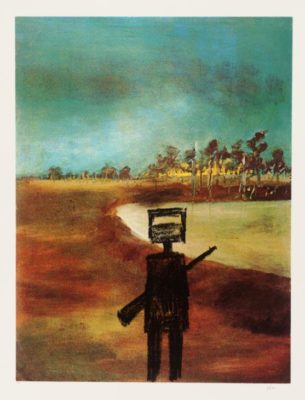Are you a bogan or a snob? The Ned Kelly division

Ned Kelly as a symbol in Australian class conflict.
I had no idea Ned Kelly was such a divisive figure in Australian history until I started telling people I was reading about him. Now it seems every (white) person has an opinion to share. They may not even know any information about Kelly’s life, but they will still want to have their say about whether Kelly was Good or Bad.
You can see this debate in action in the comments on book review sites and Kelly-related articles. Belligerent Kelly admirers assert that he was hard done by, while other more haughty responders charmingly conclude that Kelly was ‘scum’.
Basically, everyone falls into one of two categories.
1. The first category turn their noses up at the mention of Ned Kelly. Even taking an interest in Kelly is lowbrow. Kelly was a violent thug who disrupted polite society, and the heroic police brought him to justice. If this is you, you may like to consider the possibility you could be a pretentious snob.
This mindset is not constructive towards a fairer viewpoint of Australian history and present culture. It plays in to the demonisation of the working class, and fails to consider the impact economic disadvantage has on people’s lives. Well-to-do Australians still want to distance themselves from anything too ‘occa’. Shunning lower class perspectives just shows how the social stratification of colonial Australia continues in the present.
2. The second category of people love Ned Kelly. They idolise him. He symbolises rebellion against an oppressive government and the educated elites. He represents a kind of ‘true blue’ Australian ideal of loyalty and mateship. If this is you, I’m sure you’re already proudly aware that you are a bogan. Is that a little Southern Cross tattoo poking out of your sleeve?
The problem with using Kelly as a symbol of what is Australian is that it is easily co-opted as a macho symbol of xenophobia and racism. Is the ideal Australian a white male who expresses himself through violence and anger? This meathead version of Kelly perpetuates our cultural problems with toxic masculinity and race.
A key issue with the mythology surrounding Kelly is that it is predominantly centered in white culture. It’s easier to imagine Kelly and yourself as the ‘true’ Australians when you ignore the existence of First Nations people.
Romantic portrayals of Kelly’s story often exclude representations of non-white characters, or if they are present the story downplays any racism they would encounter. This makes the story more palatable for a modern, white audience seeking to define a national identity.
Most Australians would recognise Kelly’s name and iron mask, and be familiar with him battling police. But how many people would recognise the names Tarenorerer, Pemulwuy, and Jandamarra? We may mythologise the story of Kelly as a heroic underdog, but First Nations warriors rarely get this exceptional treatment.
Ned Kelly can symbolise many aspects of Australian culture, it just depends on who you talk to.
Trying to understand Australia’s relationship with Ned Kelly raises a lot of questions about our national identity.
Are we just a malformed offcut of British society? Is it time to stop bogan shaming? Will we ever have a national symbol that isn’t associated with white supremacy? When will we celebrate First Nations historical figures?
So, is Kelly a hero or a villain?
My opinion? I just want to read a good story, and the fact that Kelly is so divisive makes him even more compelling to learn about.
(If you want to read further, I greatly enjoyed and recommend this essay by John Kinsella.)
Art by Sidney Nolan.
This article was inspired by Peter Carey’s book: